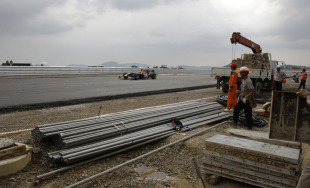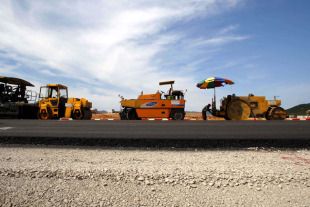
- News:
-
Korean GP inspection set for October 11
- News:
-
Ecclestone admits to concerns over Korean GP
- News:
-
FIA delays Korea inspection
- Race:
- Korean Grand Prix
- Championship:
- FIA Formula One World Championship
- Circuits:
- Korean International Circuit
With less than six weeks to go before the inaugural Korean Grand Prix, the headlines surrounding the event all continue to be dominated by the readiness of the circuit. While the race is almost certain to go ahead - the finances of the sport dictate that - there are short and long-term concerns about the whole venture.
Everything was due to be finished in July, 32 months after construction began, but labourers are still frantically working to ensure everything is completed in time.
"It will be ready, it's a must," Jason Cho, the man in charge of the Korean International Circuit, told AP this week. "If we don't finish then we don't have an event so it will be done in ten days."
Cho is also ready with reasons why things are so behind. "There's been a lot of rain compared to most years and all this land was all wetland and we had to take all the water out first … 70% of the work was because of hardening the land. If it was just regular land, we could have done it in a year. That made it more technical.
"We don't have experience in Korea of building tracks up to F1 standard. If there had been a manual of guidelines to follow, it would have made our work much easier and we would have finished sooner."
Even if the race goes ahead, the worries are not over. There are increasing concerns being voiced about the level of support for a grand prix in Korea in general, and in such a remote part of the country in particular. Some other new circuits have been overshadowed by poor attendances, and critics claim Korea will be no different.
The fears are given more substance by Peter Baek, the deputy marketing manager, who told AP the current location was not the first choice. "Initially, our CEO wanted to hold it in Seoul and have a night race that they could race on the street," he said. "That was many years ago and it didn't happen.
"Next year will be better and there will be a fan base established in Korea," he added, almost engaging in a preemptive damage-limitation exercise. "We are marketing and promoting the event but people think that it isn't ready."
The organisers refuse to reveal how many tickets have been sold, but the remote site - the nearest big city, Mokpo, is more than four hours away - can only add to the event's lack of appeal. Even if crowds do turn out then that will in turn cause its own difficulties as the infrastructure appears unable to cope with the traffic.
"Transportation-wise, there are obviously not enough planes going down to the Mokpo area," Baek told AP. "During the grand prix there's going to be chartered flights, buses, trains and all sorts of transportation available to the public. It's normally four hours to drive, I wouldn't expect more than four and a half hours even with the traffic."

Although it continues to take F1 to new locations, the FIA's determination to base its decisions on cash almost regardless of other factors - especially the local interest in the sport and the location of the circuits - have left the Formula One roadshow going to some places where grands prix take place against a backdrop of indifference. It's all very well to argue it is taking the sport into to new markets, but shouldn't consolidating the existing ones be equally important?
Assuming the organisers have a workable circuit by the time the FIA inspect later this month, the Korean Grand Prix will go ahead and contractually will remain on the schedule for the next seven years regardless. But you can't but help get the feeling that the hard work will really start when the builders leave.
Martin Williamson is managing editor of digital media ESPN EMEA
© ESPN Sports Media Ltd.
 Martin Williamson is managing editor of digital media ESPN EMEA Martin Williamson, who grew up in the era of James Hunt, Niki Lauda and sideburns, became managing editor of ESPN EMEA Digital Group in 2007 after spells with Sky Sports, Sportal and Cricinfo
Martin Williamson is managing editor of digital media ESPN EMEA Martin Williamson, who grew up in the era of James Hunt, Niki Lauda and sideburns, became managing editor of ESPN EMEA Digital Group in 2007 after spells with Sky Sports, Sportal and Cricinfo

